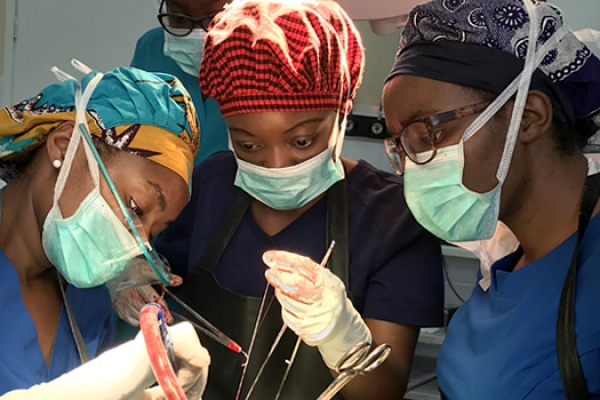gynecological programs in Kenya.
Read this article to the end if you’re interested in learning more about gynecological programs in Kenya.
In case you were wondering, medical professionals in Kenya who are interested in women’s reproductive health can take advantage of the excellent Gynecology courses offered there.
Simply put, this program will teach you everything you need to know about obstetrics, reproductive endocrinology, and infertility, as well as the diagnosis, treatment, and management of gynecological problems.
This article will discuss the various gynecological programs in Kenya and how they help students get ready for a career in the area.
Read on……
There is a wide variety of gynecological training opportunities in Kenya, from certificate programs to undergraduate and graduate degrees.
Detailed descriptions, necessary skills, and potential employment at each level are provided below.
Gynecology and Obstetrics Certification
This is a crash course that will teach you everything you need to know to help a gynecologist with their work on women’s reproductive systems.
Specifically, the course delves into the inner workings of the female reproductive system, the menstrual cycle, typical gynecological diseases, various forms of contraception, and other pressing matters pertaining to women’s health.
A KCSE grade of C-minus or higher is required for admission.
Other Requirements for Admission
Certification in either nursing or clinical medicine from an accredited program.
A current and valid license to practice issued by the appropriate regulatory organization.
In addition, you may need to have prior work experience in the health care industry or pass an entrance exam to be accepted at some schools.
It’s important to keep in mind that program prerequisites can change based on where you enroll.
Employment Prospects for Those With a Gynecologist Certification:
You can get employment as a gynecological assistant in a variety of medical settings.
PAT DOWN
📣 Excuse me! Are you a Kenyan student in search of the finest educational prospects the country has to offer? Stop looking now! If you’re interested in keeping up with the latest research and discussion surrounding these issues, consider joining our Facebook page.
In order to stay up-to-date on the top courses in Kenya, the best colleges and universities in Kenya, career opportunities, scholarships in Kenya, etc., please follow Kenya Education Guide on Facebook.
🙏Thanks.
GYNECOLOGY DEGREE
Training in all aspects of gynecological care, including patient care and reproductive health, is provided to those who earn a gynecology diploma.
Coursework and clinical rotations provide students with the foundational information and skills need for a career in gynecology.
Reduced-rate entry Prerequisites: Typically, a high school diploma or equivalent is required, and a certificate in nursing or a related profession is recommended.
Opportunities for those with a gynecological diploma include working as gynecology nurses and as instructors in reproductive health.
Gynecology Undergraduate Degree
There is no such thing as a “bachelor of gynecology,” because the field is too broad for a single undergraduate degree.
In a nutshell, it is a subspecialty of medicine concerned with women’s reproductive health, gynecological surgery, and scientific investigation.
You must have a KCSE average of C+ to be admitted.
In addition, you need a B or above in each of the cluster subjects listed below.
Chemistry
Biology
Physics/Mathematics
English/Kiswahili
Possibilities in the Labor Market:
You can become a hospital gynecologist, conduct research on reproductive health, or go on to graduate school with a bachelor’s degree in this field.
Graduate Study in Gynecology
Specialist training in fields like gynecological oncology, reproductive endocrinology, and infertility is available to those who pursue a master’s degree in gynecology.
The bare bones of eligibility:
A bachelor’s degree in medicine or a closely related subject is required for graduate study in gynecology.
You should also take into account the fact that many universities have very precise prerequisites, such as prior work experience in the field.
Possibilities for employment after earning a Master of Science in Gynecology include working as a consultant or specialist in the field, or going on to complete a Doctor of Philosophy degree and conducting academic research.
Having studied gynecology at every level in Kenya from certificate to master’s, I can tell you who teaches each course and where you may go to school for it.
Who, then, is responsible for Kenya’s gynecology education?
Kenya’s gynecology courses are taught by doctors who have completed additional training in the specialty.
A gynecologist is a doctor who has completed their general medical education and gone on to specialize in obstetrics and gynecology.
There are a few Kenyan universities that provide training in gynecology.
When considering Kenyan universities, keep in mind that gynecological training is only available through the medical faculty.
Medical School, University of Nairobi
Provides an obstetrics and gynecology track within its Bachelor of Medicine and Bachelor of Surgery (MBChB) degree program.
Nairobi, Kenya’s Kenyatta University
Provides an obstetrics and gynecology track within its Bachelor of Medicine and Bachelor of Surgery (MBChB) degree program.
Eldoret, Kenya’s Moi University
Provides an obstetrics and gynecology track within its Bachelor of Medicine and Bachelor of Surgery (MBChB) degree program.
Nairobi’s Aga Khan Medical Center
Provides an obstetrics and gynecology track within its Bachelor of Medicine and Bachelor of Surgery (MBChB) degree program.
The University of Mount Kenya, Thika
Provides an obstetrics and gynecology track within its Bachelor of Medicine and Bachelor of Surgery (MBChB) degree program.
JKUAT-Nairobi, or Jomo Kenyatta University of Agriculture and Technology
Provides an obstetrics and gynecology track within its Bachelor of Medicine and Bachelor of Surgery (MBChB) degree program.
Location: Nairobi, Kenya; Name: Nairobi Hospital Training Center
Provides a variety of gynecology-related training programs, such as ultrasonography and gynecological endoscopic courses, for medical professionals.
Kenyan Medical and Dental Training Center
Includes gynecology as a topic of study in its Diploma in Clinical Medicine and Surgery program.
FAQs about studying gynecology in Kenya
In Kenya, how long would it take to complete a degree in gynecology?
A bachelor’s degree can be earned in four years, but keep in mind that the internship can add another three to seven.
Does KMTC have a gynecology department?
Yes! Gynecology is taught as part of KMTC’s Diploma in Clinical Medicine and Surgery program.
How much does a visit to a gynecologist in Kenya typically cost?
The average private hospital consultation with a gynecologist in Kenya costs between Kshs. 2,500 and Kshs.3,000.
Conclusions on Kenya’s Gynecology Education Program
As we draw to a close, they will be the gynecological programs available in Kenya.
A medical degree and additional training in obstetrics and gynecology are necessary to practice as a gynecologist.
Remember that there are residency programs and other opportunities for advanced study in gynecology that await you after you earn your MD.VV



